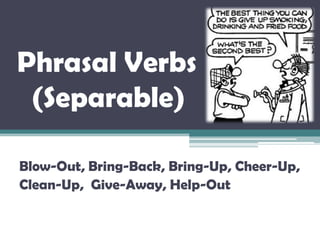franz phrasal verbs
- 1. Phrasal Verbs (Separable) Blow-Out, Bring-Back, Bring-Up, Cheer-Up, Clean-Up, Give-Away, Help-Out
- 2. Blow out • Extinguish a match or a candle. • Defeat decisively
- 3. Review 1. He blow the candles out on her birthday cake. 2. The Broncos blow out the Raiders 55-0.
- 4. Bring back • Return something
- 5. Review 1. Yes, you can borrow my pen, don't forget to bring it back to me when you're finished. 2. He took the calculator home yesterday and hasn't brought it back yet.
- 6. Bring up • Raise(children)to take care of a child until it is fully grown and able to care for itself; to train and prepare a child for adult life • Mention , start to talk about something (as a topic of discussion)
- 7. Review 1. I was brought up by my grandmother. It isn't easy to bring up children nowadays. 2. I hate him. Don't ever bring his name up again! "We planned to discuss overtime pay in them meeting. Why didn't someone bring that topic up?“ 3. He drank so much that he brought his dinner up in the toilet.
- 8. Cheer up • Something or someone that help someone to become happier or feel less worried/depressed /sad
- 9. Review 1. I brought you some flowers to cheer you up. 2. She cheered up when she heard the good news. 3. Sarah is depressed; we have to cheer her up.
- 10. Clean up • Make neat and clean
- 11. Review 1. Please clean up your bedroom before you go outside. 2. Please clean up your bedroom before you go outside.
- 12. Give away • Donate, get rid of by giving • Reveal hidden information about someone • Ruin a secret
- 13. Review 1. The library was giving away old books on Friday. 2. His false identity papers gave him away. 3. My little sister gave the surprise party away by accident.
- 14. Help out • Assist (someone)
- 15. Review 1. Dad helped out with $200 2. His parents help him out financially
- 16. This is the end. Thank you!
















